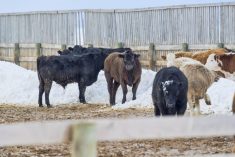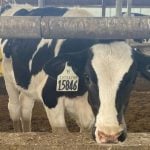Alberta fed cattle prices jumped to three-month highs, reaching $174 over the past week, setting a positive tone for feeders to start off the New Year. Retailers appear to be featuring beef at discounted prices, alleviating the bloated beef pipeline. Wholesale prices also ratcheted higher, reflecting the improving demand.
While pen closeouts remain in negative territory, there appears to be light on fresh placements coming into feedyards. Minimal sales occurred during the last week of 2015 but prices are now where feedlots can recoup some of the recent equity erosion in the deferred positions. Investors placing cattle in custom yards shrugged off the frustration of feedlot hands, having to work through the New Year’s holiday, and feedlot operators were only happy enough to see a spark in the market.
Read Also

U.S. grains: Chicago grain prices fall amid profit-taking and dollar rebound
Chicago | Reuters – Chicago corn, soybean and wheat futures fell on Friday, pressured by profit-taking and a rebound in…
Charolais-cross steers averaging 760 lbs. with medium to lower flesh were quoted at $208 landed in southern Alberta, basically the same value compared to mid-December. Black medium-flesh semi-weaned steers averaging around 600 lbs. were quoted at $234 in central Alberta while similar heifers averaging just under 700 lbs. were quoted at $193 in the same region. Markets in Saskatchewan and Manitoba were quiet during the holiday week but ideas are we could see the market trade $8-$10 higher over the next week. The Canadian dollar continues to deteriorate and U.S. feeder markets experienced a week-over-week gain of $10 during shortened holiday activity.
Western Canadian retail beef prices this past week had lean ground beef prices down 30 per cent from mid-December; higher-end product reflected sharper discounts, with beef strip loin steaks at $1.97 per 100 grams compared to regular prices of $4.94 per 100 grams. We haven’t seen beef featured for some time, so this is a positive signal that the market is encouraging demand at the retail level. (Bacon was also selling for 50 per cent off at some grocery stores.)
The recession in Western Canada has taken a toll on the beef complex, but enhanced movement through the processing chain should stabilize fed and feeder cattle prices moving forward.
–– Jerry Klassen is manager of the Canadian office for Swiss-based grain trader GAP SA Grains and Produits. He is also president and founder of Resilient Capital, which specializes in proprietary commodity futures trading and commodity market analysis. Jerry owns farmland in Manitoba and Saskatchewan but grew up on a mixed farm/feedlot operation in southern Alberta, which keeps him close to the grassroots level of grain and cattle production. Jerry is a graduate of the University of Alberta. He can be reached at 204-504-8339.














